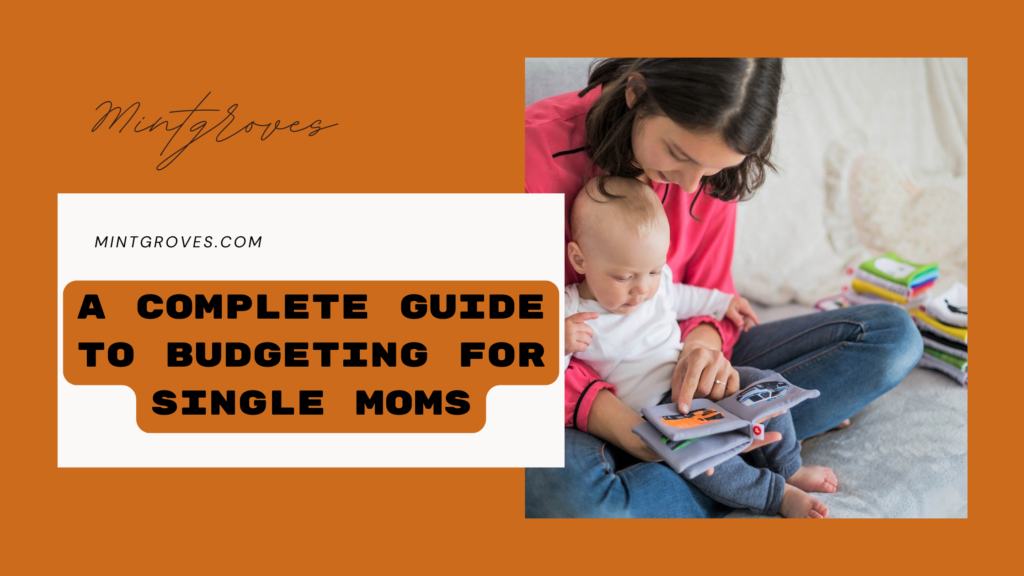Introduction to Budgeting for Single Moms.

Budgeting for Single Moms is a vital practice for anyone striving for financial stability, but it holds particular significance for single moms. The unique circumstances that accompany single motherhood often lead to distinct financial challenges. Single mothers are typically responsible for covering all household expenses, including housing, childcare, education, and daily living costs, all while possibly managing a single income. This multifaceted financial responsibility can require careful planning to ensure that both immediate and long-term needs are met.
A well-structured budget allows single moms to take control of their financial situation, paving the way for increased confidence and independence. By prioritizing essential expenses and making informed choices, single mothers can cultivate a sense of financial security, which is crucial for creating a stable environment for their children. Moreover, an effective budgeting strategy can help single moms allocate funds for savings, emergencies, and future goals, all of which contribute to a more fulfilling life.
This guide aims to equip single mothers with the necessary tools and knowledge to manage their finances effectively. Topics covered will include assessing income and expenses, determining financial priorities, creating a flexible budget plan, and implementing techniques for tracking spending. By addressing these key areas, single moms can become adept at taking charge of their financial futures, ultimately leading to greater independence and enhanced quality of life.
In addressing the unique financial hurdles that single mothers face, this guide will not only advocate for efficient budgeting practices but will also highlight the importance of cultivating a mindset focused on financial empowerment. Through the strategies outlined, single moms can navigate their financial challenges with confidence and resilience.
Understanding Your Income: The First Step in Budgeting for Single Moms

For single mothers, the budgeting process begins with a clear understanding of income sources. Identifying each stream of income is crucial, as it sets the foundation for financial planning. Single moms may have various income sources, including wages from a job, child support, government assistance, and any side jobs or freelance work. It is vital to list all these sources to gain a comprehensive view of available funds.
Calculating your monthly net income, which is your total income after taxes and deductions, is an essential task in this initial step. To calculate this, gather your pay stubs and add up your total earnings across all income sources for the month. Then, deduct any mandatory expenses such as taxes, retirement contributions, and health insurance premiums. This will provide a realistic figure that reflects your actual earnings. Remember to include irregular income, such as bonuses or tax refunds, but budget carefully to avoid reliance on income that may not recur every month.
Being realistic about your earnings is crucial when budgeting expenses. Single moms should avoid overestimating their income, as this can lead to financial strain. Instead, consider average income if your job pays variably or your child support fluctuates. Establishing a conservative income figure can help create a more sustainable budget plan. Additionally, tracking your income for at least three months can help identify patterns and assess whether you need to make adjustments to your budget based on consistent discrepancies.
Thus, understanding and accurately calculating income is the cornerstone for effective budgeting for single mothers. This will not only help in determining spending limits but will also empower single moms to make informed decisions regarding their finances.
Essential Expenses Every Single Mom Should Include in Her Budget

Managing a budget is crucial for single moms, as they bear the responsibility of not only meeting their own needs but also those of their children. To ensure financial stability, it is essential to identify and categorize crucial expenses effectively. Here are the main categories that single moms should include in their budgets.
Housing is often the largest expense and typically includes rent or mortgage payments, property taxes, and homeowner’s insurance. It is vital for single moms to secure affordable housing options. Communities may offer assistance programs, while negotiating rent or exploring co-housing arrangements can reduce costs.
Utilities, such as electricity, water, and gas, are necessary expenses that can fluctuate seasonally. Single moms should consider ways to cut down on these costs by adopting energy-saving practices, such as using energy-efficient bulbs or managing thermostat settings effectively. Planning ahead for these variable costs can help maintain financial stability.
Groceries represent another significant expense, making it essential for single moms to prioritize meal planning and budgeting accurately. Shopping with a list, utilizing coupons, and purchasing in bulk can result in substantial savings. Additionally, exploring local food banks and community support programs can provide assistance when necessary.
Childcare is an unavoidable cost for many single mothers. Whether opting for daycare, babysitters, or after-school programs, it’s essential to research available options thoroughly. Many families benefit from tax credits or subsidies that can relieve some of the financial burden associated with childcare.
Transportation expenses, including car payments, insurance, and fuel, should also be part of any thorough budget. Single moms can consider carpooling, using public transportation, or even researching used vehicles that fit their budget. Overall, evaluating these expenses regularly will better equip single moms to manage their finances effectively.
Creating a Budget Plan: A Practical Guide for Single Moms

Budgeting is a crucial skill for single moms who aim to manage their finances effectively while providing for their families. Developing a budget plan not only helps visualize financial situations but also enables better decision-making and financial stability. The first step in creating a budget is to gather all financial information, including income sources, monthly expenses, and any debts. This comprehensive overview will provide clarity on where funds are being allocated each month.
One effective budgeting method to consider is the envelope system. This traditional technique involves dividing cash into different envelopes designated for specific spending categories such as groceries, entertainment, and transportation. Once the money in an envelope is exhausted, no further spending occurs in that category for the month, promoting discipline and awareness of spending habits.
Another popular strategy is zero-based budgeting, which allocates every dollar of income into specific expenses, savings, or debt payments. This method encourages individuals to think critically about spending and prioritize essential expenses while still allocating room for savings and leisure. By ensuring that every dollar has a purpose, single moms can create a comprehensive financial roadmap that aligns with their family’s needs.
To assist in visualizing and managing budgets, various tools are available. Budgeting apps like Mint, YNAB (You Need A Budget), and EveryDollar offer user-friendly interfaces for tracking income and expenses on the go. Additionally, spreadsheets can be a practical alternative, allowing customization and detailed categorization of finances. These tools help empower single moms to keep a close eye on their financial situation, enabling them to make informed adjustments as necessary.
By implementing a practical budgeting plan and utilizing effective tools, single moms can take charge of their finances and create a secure future for themselves and their children.
Saving Strategies for Single Moms: Building an Emergency Fund

Building an emergency fund is a critical financial strategy for single moms. It provides a financial safety net that can cushion against unexpected expenses, such as medical emergencies, car repairs, or sudden job loss. Establishing this fund is particularly important for those managing on a single income, as even minor financial disruptions can create significant stress.
To create an emergency fund, single moms should start by assessing their current financial situation. Consider your monthly expenses and identify how much you can allocate towards savings, even if it is a modest amount. The key is consistency; saving regularly, even small contributions, can accumulate over time. For example, setting aside just $10 per week can lead to over $500 in a year.
Automating savings can be a helpful strategy. Set up a dedicated savings account and arrange for a portion of your income to be transferred automatically into this account each month. This way, you prioritize saving before you have a chance to spend that money elsewhere. Many banks also offer tools to assist with this process, making it easier to reach your savings goals.
Additionally, single moms can cut unnecessary expenses as a means of increasing their savings rate. Evaluate current subscriptions, dining out habits, and entertainment expenses to identify areas where you can trim costs. Redirecting even a portion of these savings into your emergency fund will help it grow more rapidly. Consider also leveraging community resources—such as food banks, local assistance programs, or even community swap events—to reduce living costs and bolster your ability to save.
Establishing an emergency fund is an empowering step for single moms towards financial security. Although the process may seem daunting, consistent small actions can lead to significant results over time, ensuring you are better prepared for whatever life throws your way.
Balancing Wants and Needs in Budgeting for Single Moms

When it comes to budgeting, understanding the distinction between wants and needs is crucial, especially for single moms navigating financial responsibilities. Needs are essential expenses required for survival and basic functioning, such as housing, utilities, groceries, and healthcare. In contrast, wants represent discretionary spending, encompassing items and services that enhance life but are not required. For instance, dining out, subscription services, and luxury items fall into the “wants” category.
Effective budgeting for single mothers involves a careful evaluation of these categories and a strategic allocation of finances. One effective approach is to utilize the 50/30/20 budgeting rule, which provides a balanced framework for expenditure. Under this method, 50% of income should go toward needs, 30% towards wants, and 20% for savings and debt repayment. This structure helps ensure vital expenses are prioritized while still allowing room for some enjoyment.
Single moms may also consider creating a prioritized list of needs and wants. This list can serve as a reference during the budgeting process, helping to clarify essential expenses while identifying items that can temporarily be set aside or eliminated. Moreover, engaging in regular budget reviews can prevent overspending on non-essential items, enabling adjustments based on changing circumstances.
To manage discretionary spending effectively, setting aside a specific allocation for wants each month can promote a sense of financial freedom without jeopardizing essential needs. This method allows single moms to indulge in self-care or leisure activities without guilt, thereby maintaining a healthy balance with their finances. Ultimately, by clearly distinguishing between wants and needs, single moms can create a budget that supports both their fundamental requirements and their personal aspirations.
Using Discounts and Assistance Programs: Smart Budgeting for Single Moms

Budgeting can pose unique challenges for single mothers, particularly when managing various expenses on a limited income. However, numerous discounts and assistance programs are available that can significantly alleviate financial burdens. One vital resource is governmental aid, which includes initiatives such as the Supplemental Nutrition Assistance Program (SNAP). SNAP offers eligible single mothers assistance with purchasing nutritious food, ensuring that their families do not compromise on essential dietary needs.
Additionally, the Temporary Assistance for Needy Families (TANF) program provides cash assistance, which can be instrumental in meeting immediate household expenses. Each state may have specific eligibility criteria, but these programs are designed to offer support during difficult times. Furthermore, local community resources often provide vital support. Non-profit organizations, food banks, and local charities frequently offer free or discounted services ranging from clothing to financial planning assistance, enabling single moms to stretch their budgets further.
Another effective tool for single mothers managing their finances is budgeting applications. Numerous budgeting apps are designed to help track spending and savings efficiently. These applications allow users to categorize expenses, set financial goals, and receive alerts when approaching limits. Popular options include Mint, YNAB (You Need A Budget), and EveryDollar, which can be especially beneficial for single moms aiming for financial stability. By utilizing such resources, single mothers can optimize their budgets to reduce stress and focus on what truly matters: providing for their families.
In conclusion, by actively seeking out discounts, government assistance programs, and leveraging technology through budgeting apps, single moms can create a more manageable financial landscape. This proactive approach enables them to concentrate on their family’s welfare while working towards long-term financial stability.
Reviewing and Adjusting Your Budget: Continuous Budgeting for Single Moms

For single moms, maintaining a sustainable budget is not a one-time task but a continuous process that requires regular review and adjustment. Life is unpredictable; thus, it is vital to revisit your budget frequently to accommodate any changes in income, expenses, or family needs. Typically, reviewing the budget monthly is advisable. This allows you to catch any discrepancies early, evaluate spending habits, and ensure that you are staying on track towards your financial goals.
While reviewing your budget, several key metrics should be taken into account. First, look at your essential expenses, such as housing, utilities, food, and childcare. These are your fixed costs and should be clearly defined in your budget. Next, examine your discretionary spending, which often includes entertainment, dining out, and non-essential purchases. Understanding where your money goes can highlight areas where adjustments may be necessary.
Additionally, it is crucial to account for variable expenses that might arise due to unforeseen circumstances, such as medical bills or car repairs. Build a small buffer into your budget for these unexpected costs to prevent financial strain when they occur. Keep in mind that your financial situation may change; for instance, a change in employment, fluctuating income, or a child starting school can significantly impact your budget. Therefore, adaptability is a critical component of successful budgeting.
As you make assessments, actively seek ways to cut costs, whether that be through meal planning or exploring local resources and assistance programs designed for single parents. By committing to regularly reviewing and adjusting your budget, you empower yourself to manage your finances effectively, ensuring you remain equipped to handle both expected and unexpected challenges in your journey as a single mom.
Conclusion: Empowering Single Moms through Smart Budgeting
In this guide, we have delved into the essential elements of budgeting for single moms, emphasizing their unique financial challenges and opportunities. Effective budgeting serves as a powerful tool that allows single mothers to attain financial stability, ensuring that they meet both their immediate needs and future goals. By carefully tracking income and expenses, single moms can identify areas for improvement and make informed decisions that contribute to their overall financial health.
We discussed various strategies that can empower single mothers, such as establishing a clear budget, prioritizing necessary expenses, and setting achievable savings goals. Creating a flexible financial plan allows for adjustments as circumstances evolve, providing a sense of control over one’s finances. Furthermore, seeking support from financial resources, such as community programs or financial advisors, enhances budgeting efforts and fosters a collaborative approach to financial management.
The journey towards financial independence involves commitment and determination, but the results are worthwhile. As single moms actively engage in smart budgeting, they become not only more aware of their financial situation but also more equipped to handle unexpected challenges. This empowerment leads to greater confidence in making financial decisions, ultimately paving the way for a more secure future for both themselves and their children.
Inspiring stories of single mothers who have navigated their way toward financial stability demonstrate that it is indeed possible to manage finances successfully. The key lies in taking proactive steps towards budgeting, seeking assistance when necessary, and fostering a resilient mindset. Remember, every small step taken in the realm of budgeting contributes to achieving financial independence and a brighter future.
